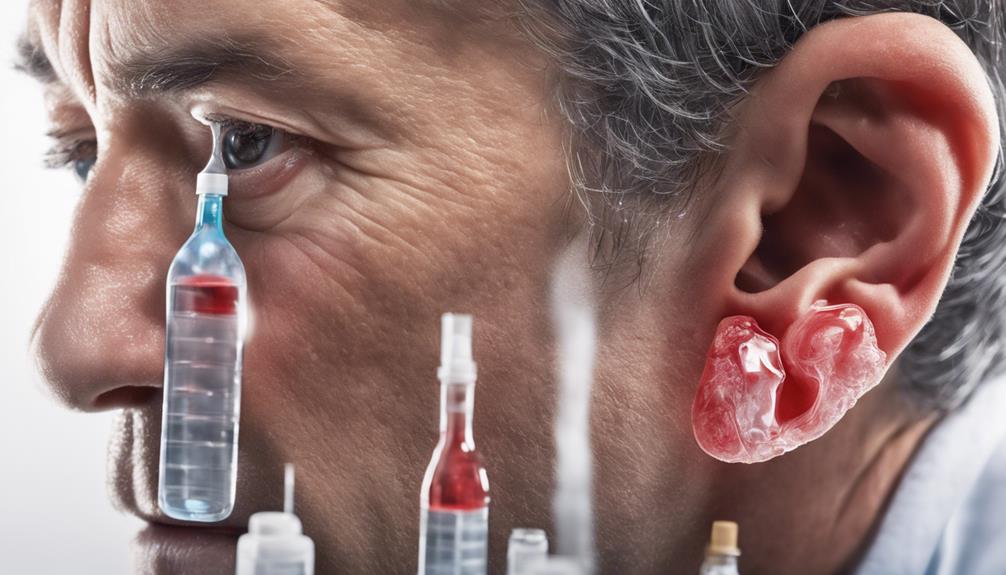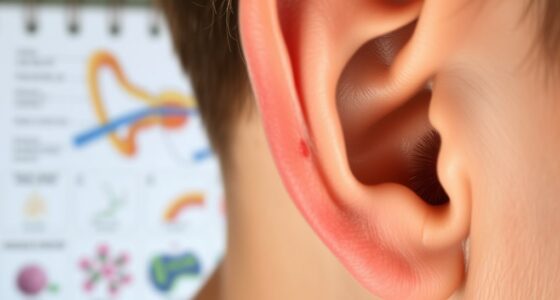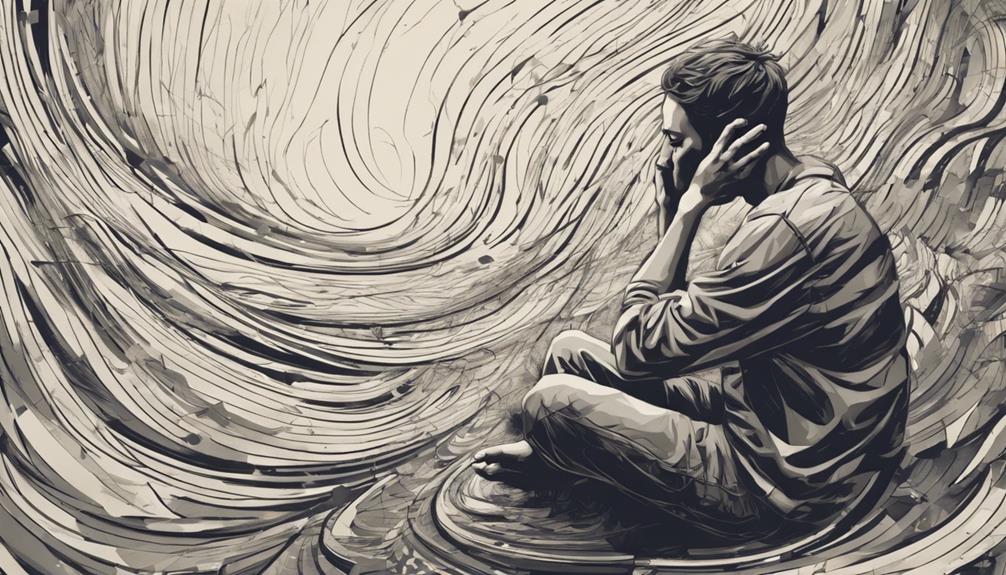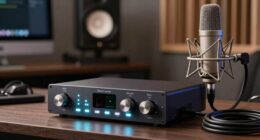Have you ever thought about how a common cold can cause hearing loss in one ear?
The intricate connection between our respiratory and auditory systems unveils a cascade of events that can disrupt our hearing acuity.
From the onset of nasal congestion to the potential impact on delicate ear structures, the repercussions of a cold on our hearing merit closer examination.
Let's explore the underlying mechanisms that lead to this intriguing phenomenon and discover why prompt medical intervention is crucial in mitigating the effects of cold-induced hearing loss.
Key Takeaways
- Cold-induced inflammation can disrupt Eustachian tube function, leading to hearing loss.
- Sinus pressure changes during a cold can affect air pressure balance in the ear.
- Cold-related fluid accumulation in the middle ear may cause conductive hearing loss.
- Cold viruses can target inner ear structures, impacting auditory perception.
Mechanism of Hearing Loss in One Ear
When a cold affects an individual, the mechanism behind hearing loss in one ear can often be traced to fluid accumulation or inflammation impacting the Eustachian tube on that particular side. The Eustachian tube plays a crucial role in maintaining equal air pressure between the middle ear and the atmosphere. During a cold, the tube may become blocked or inflamed, disrupting this balance and leading to hearing impairment in one ear. Viral or bacterial infections associated with the cold can directly target the inner ear structures on one side, further exacerbating the issue. In some cases, the delicate components of the inner ear, such as the cochlea or auditory nerve, can sustain damage due to the infection, resulting in unilateral hearing loss.
It is essential to seek prompt medical evaluation when experiencing hearing loss in one ear during a cold to identify the specific cause accurately. This evaluation can help determine whether the hearing loss is due to Eustachian tube dysfunction, inner ear infection, or structural damage, guiding appropriate treatment interventions for optimal outcomes.
Impact of Cold on Ear Function

Cold exposure can lead to various disruptions in ear function, impacting mechanisms crucial for auditory perception. When a cold strikes, the following effects on ear function may occur:
- Eustachian Tube Dysfunction: Inflammation from a cold can cause the Eustachian tubes to become blocked or swollen, affecting the equalization of pressure in the middle ear.
- Fluid Buildup: Cold-induced fluid accumulation in the middle ear can lead to conductive hearing loss in one ear by interfering with the transmission of soundwaves.
- Increased Sinus Pressure: The increased pressure from sinus congestion during a cold can affect one ear more than the other, resulting in temporary hearing impairment due to changes in pressure within the ear.
These disruptions in ear function highlight the intricate relationship between the common cold and its impact on hearing. Understanding these mechanisms is crucial in addressing and potentially preventing cold-related hearing issues such as unilateral hearing loss.
Risk Factors for Unilateral Hearing Loss
Exposure to various risk factors can significantly contribute to the development of unilateral hearing loss, a condition characterized by hearing impairment in one ear only. Head trauma, such as skull fractures or concussions, poses a risk for unilateral hearing loss due to damage to the auditory structures. Conditions like acoustic neuroma, a noncancerous tumor on the cranial nerve, and Meniere's disease, affecting the inner ear's fluid balance, can also lead to this type of hearing loss.
Additionally, exposure to loud noises, whether occupational or recreational, can cause damage to the delicate structures within the ear, resulting in unilateral hearing loss. Ototoxic medications, genetic factors, and infections like otitis media, sudden sensorineural hearing loss, or autoimmune diseases are other significant contributors to unilateral hearing loss. Understanding these risk factors is crucial for early identification and intervention to prevent further deterioration of hearing function.
Treatment Options for Cold-Induced Hearing Loss

Treatment options for cold-induced hearing loss may involve utilizing decongestants to alleviate sinus pressure. In cases where bacterial infections contribute to hearing loss, antibiotics may be prescribed to combat the infection. Additionally, antiviral medications can be used to address viral infections affecting the inner ear.
Earwax removal is another crucial intervention, especially when blockages impede sound conduction. In situations where fluid buildup behind the eardrum leads to persistent hearing issues, ear tubes may be recommended to facilitate drainage and ventilation, restoring auditory function.
It's essential to address these underlying causes promptly to prevent long-term complications and ensure optimal hearing health. In severe and chronic cases of cold-induced hearing loss, hearing aids or implants may be suggested for ongoing management and improved quality of life. By employing these targeted treatment approaches, individuals experiencing cold-induced hearing loss can effectively address the root causes and restore their auditory function.
Preventing Hearing Impairment During a Cold
To safeguard against potential hearing impairment during a cold, proactive management of congestion through the use of decongestants and maintaining adequate hydration levels is essential. During a cold, fluid buildup and congestion can obstruct the Eustachian tube, leading to one-sided hearing loss. Decongestants work by reducing swelling in the nasal passages, which can help alleviate congestion and promote Eustachian tube drainage. Ensuring proper hydration is crucial as it helps maintain the thin consistency of the fluid in the Eustachian tube, aiding in its clearance.
Monitoring changes in hearing, especially one-sided hearing loss, is important during a cold. If symptoms persist or worsen, seeking medical evaluation is recommended to determine the underlying cause of the hearing impairment. A healthcare provider can assess the severity of the condition and recommend appropriate treatment, which may include prescription medications or further interventions to address the issue effectively. By staying vigilant, managing congestion, and seeking timely medical guidance, individuals can reduce the risk of long-term hearing complications associated with cold-related Eustachian tube dysfunction.
Frequently Asked Questions
Is It Normal to Lose Hearing in One Ear With a Cold?
Losing hearing in one ear with a cold isn't typical, as hearing loss usually affects both ears. Unilateral hearing loss in one ear during a cold could point to an underlying issue.
Possible causes include ear infections, sinus pressure, or inner ear damage. Seeking medical assessment is crucial when experiencing this symptom.
Treatment will depend on the specific cause identified by a healthcare provider.
Why Have I Suddenly Gone Deaf in One Ear?
We've suddenly lost hearing in one ear due to various factors like viral infections, autoimmune diseases, or circulatory issues. Seeking immediate medical evaluation is crucial to determine the underlying cause and start appropriate treatment.
Symptoms may include fullness, tinnitus, dizziness, and speech comprehension difficulties. Quick action boosts recovery chances and prevents permanent hearing loss.
The exact cause of sudden deafness post-cold might be unclear, emphasizing the need for prompt medical attention.
How Do You Clear a Muffled Ear?
When experiencing a muffled ear, we can employ techniques like the Valsalva maneuver or warm compresses to alleviate symptoms.
Over-the-counter decongestants and nasal sprays may also help by reducing inflammation.
Chewing gum or swallowing frequently can aid in equalizing pressure within the ear, promoting clearer hearing.
It's crucial to avoid inserting objects like cotton swabs into the ear canal, as this can exacerbate the issue by pushing wax further in.
When Should I Be Concerned About Hearing Loss in One Ear?
If you notice sudden hearing loss in one ear, it's crucial to seek immediate medical attention as it may signify an underlying serious condition. Factors like infections, blockages, or inner ear damage can lead to one-sided hearing loss.
Differentiating between conductive and sensorineural hearing loss is vital in assessment. Conditions like sudden sensorineural hearing loss (SSNHL) demand prompt evaluation and treatment.
Any one-sided hearing loss accompanied by dizziness, ear ringing, or pain requires evaluation by a healthcare professional.
Conclusion
In conclusion, experiencing hearing loss in one ear due to a cold can be a frustrating and concerning experience. Just like a foggy windshield obscures our view while driving, the congestion and inflammation in the ear can hinder our ability to hear clearly.
Seeking prompt medical attention and following recommended treatment can help clear away the 'fog' and restore our hearing back to normal. Remember, taking care of our ears is crucial for overall health and well-being.










